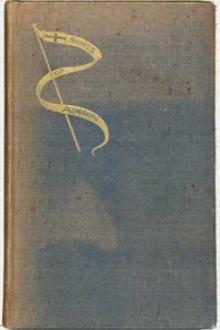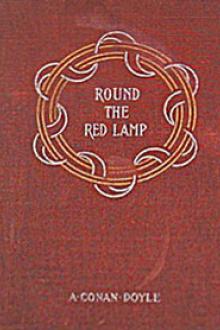author - "Arthur Conan Doyle"

Description
Even though Doyle is most famous for his Sherlock stories, he was also a prolific novelist, and The Lost World is one of his more famous non-Sherlock novels. Like many novels of the day, it was first published serially.
In it we meet a group of adventurers who head to a deep South American jungle to explore rumors of long-lost dinosaurs. The plot is driven by their journey, discoveries, and subsequent narrow escape. Notably, The Lost World is the novel in which Doyle’s popular recurring character, Professor Challenger, is introduced.
Doyle based many of the characters and locations on people and places he was familiar with: the journalist Ed Malone was modeled on E. D. Morel, and Lord John Roxton on Roger Casement; the Lost World itself was based on descriptions of Bolivia in letters sent to Doyle by his friend Percy Harrison Fawcett.
The novel remains hugely influential and widely adapted today. The title might even remind modern readers of a certain very famous movie franchise about dinosaur theme parks!

op yourself, young chap,
you've got to pay the price,
There are many sorts of visions, but none
of 'em is nice."
They found that day at Leonards Lee and
ran to Shipley Wood,
'Ell-for-leather all the way, with scent
and weather good.
Never a check to 'Orton Beck and on
across the Weald,
And all the way the Sussex clay was weedin'
out the field.
There's not a man among them could
remember such a run,
Straight as a rule to Bramber Pool and on
by Annington,
They followed still past Breeding 'ill
and on by Steyning Town,
Until they'd cleared the 'edges and were
out upon the Down.
Full thirty mile from Plimmers Style,
without a check or fault,
Full thirty mile the 'ounds 'ad run and
never called a 'alt.
One by one the Field was done until at
Finden Down,
There was no one with the 'untsman save
young Jeremiah Brown.
And then the 'untsman '_e_ was beat.

l together
To the grey goose-feather
And the land where the grey goose flew.
What of the mark?
Ah, seek it not in England,
A bold mark, our old mark
Is waiting over-sea.
When the strings harp in chorus,
And the lion flag is o'er us,
It is there that our mark will be.
What of the men?
The men were bred in England:
The bowmen--the yeomen,
The lads of dale and fell.
Here's to you--and to you!
To the hearts that are true
And the land where the true hearts dwell.
CREMONA
[The French Army, including a part of the Irish Brigade, underMarshal Villeroy, held the fortified town of Cremona during thewinter of 1702. Prince Eugene, with the Imperial Army, surprised itone morning, and, owing to the treachery of a priest, occupied thewhole city before the alarm was given. Villeroy was captured,together with many of the French garrison. The Irish, however,consisting of the regime

ion in full swing at night, with signals winking, lamps waving, engines hissing and carriages bumping. It is a terrible place down yonder, a place which will live as long as military history is written, for it is the Ypres Salient. What a salient it is, too! A huge curve, as outlined by the lights, needing only a little more to be an encirclement. Something caught the rope as it closed, and that something was the British soldier. But it is a perilous place still by day and by night. Never shall I forget the impression of ceaseless, malignant activity which was borne in upon me by the white, winking lights, the red sudden glares, and the horrible thudding noises in that place of death beneath me.
II
In old days we had a great name as organisers. Then came a long period when we deliberately adopted a policy of individuality and 'go as you please.' Now once again in our sore need we have called on all our power of administration and direction. But it has not deserted us. We still have it in a supre

. So I must just give youone or two other points which may make his character moreclear to you.
He had a dash of the heroic in him. On one occasionhe was placed in such a position that he must choosebetween compromising a lady, or springing out of a third-floor window. Without a moment's hesitation he hurledhimself out of the window. As luck would have it, hefell through a large laurel bush on to a garden plot,which was soft with rain, and so escaped with a shakingand a bruising. If I have to say anything that gives abad impression of the man, put that upon the other side.
He was fond of rough horse-play; but it was better toavoid it with him, for you could never tell what it mightlead to. His temper was nothing less than infernal. Ihave seen him in the dissecting-rooms begin to skylarkwith a fellow, and then in an instant the fun would goout of his face, his little eyes would gleam with fury,and the two would be rolling, worrying each other likedogs, below the table. He would b

tin, the state barber. Others, with clothes thrownover their arms, bustled down the passage which led to the ante-chamber.The knot of guardsmen in their gorgeous blue and silver coatsstraightened themselves up and brought their halberds to attention,while the young officer, who had been looking wistfully out of thewindow at some courtiers who were laughing and chatting on the terraces,turned sharply upon his heel, and strode over to the white and gold doorof the royal bedroom.
He had hardly taken his stand there before the handle was very gentlyturned from within, the door revolved noiselessly upon its hinges, and aman slid silently through the aperture, closing it again behind him.
"Hush!" said he, with his finger to his thin, precise lips, while hiswhole clean-shaven face and high-arched brows were an entreaty and awarning. "The king still sleeps."
The words were whispered from one to another among the group who hadassembled outside the door. The speaker, who was Monsieur Bontems, h

is very hard of hearing, so that it makes little difference whether he uses it or not.
He reads, as a duty, his weekly medical paper, so that he has a general idea as to the advance of modern science. He always persists in looking upon it as a huge and rather ludicrous experiment. The germ theory of disease set him chuckling for a long time, and his favourite joke in the sick room was to say, "Shut the door or the germs will be getting in." As to the Darwinian theory, it struck him as being the crowning joke of the century. "The children in the nursery and the ancestors in the stable," he would cry, and laugh the tears out of his eyes.
He is so very much behind the day that occasionally, as things move round in their usual circle, he finds himself, to his bewilderment, in the front of the fashion. Dietetic treatment, for example, had been much in vogue in his youth, and he has more practical knowledge of it than any one whom I have met. Massage, too, was familiar to him when it was new to our ge

Description
Even though Doyle is most famous for his Sherlock stories, he was also a prolific novelist, and The Lost World is one of his more famous non-Sherlock novels. Like many novels of the day, it was first published serially.
In it we meet a group of adventurers who head to a deep South American jungle to explore rumors of long-lost dinosaurs. The plot is driven by their journey, discoveries, and subsequent narrow escape. Notably, The Lost World is the novel in which Doyle’s popular recurring character, Professor Challenger, is introduced.
Doyle based many of the characters and locations on people and places he was familiar with: the journalist Ed Malone was modeled on E. D. Morel, and Lord John Roxton on Roger Casement; the Lost World itself was based on descriptions of Bolivia in letters sent to Doyle by his friend Percy Harrison Fawcett.
The novel remains hugely influential and widely adapted today. The title might even remind modern readers of a certain very famous movie franchise about dinosaur theme parks!

op yourself, young chap,
you've got to pay the price,
There are many sorts of visions, but none
of 'em is nice."
They found that day at Leonards Lee and
ran to Shipley Wood,
'Ell-for-leather all the way, with scent
and weather good.
Never a check to 'Orton Beck and on
across the Weald,
And all the way the Sussex clay was weedin'
out the field.
There's not a man among them could
remember such a run,
Straight as a rule to Bramber Pool and on
by Annington,
They followed still past Breeding 'ill
and on by Steyning Town,
Until they'd cleared the 'edges and were
out upon the Down.
Full thirty mile from Plimmers Style,
without a check or fault,
Full thirty mile the 'ounds 'ad run and
never called a 'alt.
One by one the Field was done until at
Finden Down,
There was no one with the 'untsman save
young Jeremiah Brown.
And then the 'untsman '_e_ was beat.

l together
To the grey goose-feather
And the land where the grey goose flew.
What of the mark?
Ah, seek it not in England,
A bold mark, our old mark
Is waiting over-sea.
When the strings harp in chorus,
And the lion flag is o'er us,
It is there that our mark will be.
What of the men?
The men were bred in England:
The bowmen--the yeomen,
The lads of dale and fell.
Here's to you--and to you!
To the hearts that are true
And the land where the true hearts dwell.
CREMONA
[The French Army, including a part of the Irish Brigade, underMarshal Villeroy, held the fortified town of Cremona during thewinter of 1702. Prince Eugene, with the Imperial Army, surprised itone morning, and, owing to the treachery of a priest, occupied thewhole city before the alarm was given. Villeroy was captured,together with many of the French garrison. The Irish, however,consisting of the regime

ion in full swing at night, with signals winking, lamps waving, engines hissing and carriages bumping. It is a terrible place down yonder, a place which will live as long as military history is written, for it is the Ypres Salient. What a salient it is, too! A huge curve, as outlined by the lights, needing only a little more to be an encirclement. Something caught the rope as it closed, and that something was the British soldier. But it is a perilous place still by day and by night. Never shall I forget the impression of ceaseless, malignant activity which was borne in upon me by the white, winking lights, the red sudden glares, and the horrible thudding noises in that place of death beneath me.
II
In old days we had a great name as organisers. Then came a long period when we deliberately adopted a policy of individuality and 'go as you please.' Now once again in our sore need we have called on all our power of administration and direction. But it has not deserted us. We still have it in a supre

. So I must just give youone or two other points which may make his character moreclear to you.
He had a dash of the heroic in him. On one occasionhe was placed in such a position that he must choosebetween compromising a lady, or springing out of a third-floor window. Without a moment's hesitation he hurledhimself out of the window. As luck would have it, hefell through a large laurel bush on to a garden plot,which was soft with rain, and so escaped with a shakingand a bruising. If I have to say anything that gives abad impression of the man, put that upon the other side.
He was fond of rough horse-play; but it was better toavoid it with him, for you could never tell what it mightlead to. His temper was nothing less than infernal. Ihave seen him in the dissecting-rooms begin to skylarkwith a fellow, and then in an instant the fun would goout of his face, his little eyes would gleam with fury,and the two would be rolling, worrying each other likedogs, below the table. He would b

tin, the state barber. Others, with clothes thrownover their arms, bustled down the passage which led to the ante-chamber.The knot of guardsmen in their gorgeous blue and silver coatsstraightened themselves up and brought their halberds to attention,while the young officer, who had been looking wistfully out of thewindow at some courtiers who were laughing and chatting on the terraces,turned sharply upon his heel, and strode over to the white and gold doorof the royal bedroom.
He had hardly taken his stand there before the handle was very gentlyturned from within, the door revolved noiselessly upon its hinges, and aman slid silently through the aperture, closing it again behind him.
"Hush!" said he, with his finger to his thin, precise lips, while hiswhole clean-shaven face and high-arched brows were an entreaty and awarning. "The king still sleeps."
The words were whispered from one to another among the group who hadassembled outside the door. The speaker, who was Monsieur Bontems, h

is very hard of hearing, so that it makes little difference whether he uses it or not.
He reads, as a duty, his weekly medical paper, so that he has a general idea as to the advance of modern science. He always persists in looking upon it as a huge and rather ludicrous experiment. The germ theory of disease set him chuckling for a long time, and his favourite joke in the sick room was to say, "Shut the door or the germs will be getting in." As to the Darwinian theory, it struck him as being the crowning joke of the century. "The children in the nursery and the ancestors in the stable," he would cry, and laugh the tears out of his eyes.
He is so very much behind the day that occasionally, as things move round in their usual circle, he finds himself, to his bewilderment, in the front of the fashion. Dietetic treatment, for example, had been much in vogue in his youth, and he has more practical knowledge of it than any one whom I have met. Massage, too, was familiar to him when it was new to our ge


